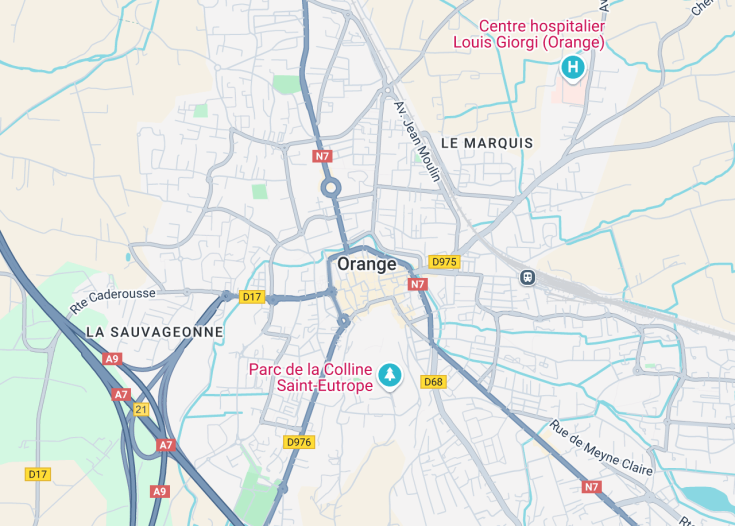Nestled in the heart of Provence, Orange in France is a captivating city steeped in history and rich culture. Known for its remarkably preserved Roman architecture, including the majestic Triumphal Arch and the ancient Theatre Antique, Orange offers a unique glimpse into the past. The city’s vibrant local markets, exquisite wine regions nearby, and the annual Chorégies d’Orange opera festival make it an enchanting destination for history enthusiasts and cultural adepts alike.
When visiting Orange, ensure to take a guided tour of the Roman Theatre and Triumphal Arch to fully appreciate their historical significance and impressive preservation.
Plan your visit in the summer to enjoy the Chorégies d’Orange, one of Europe’s oldest and most respected opera festivals, held in the ancient theatre.
Top things to do & see in Orange
Select the following sights and activities to discover best tickets and tours available in Orange.
Orange: A Slice of Ancient Roman History in France
| Country | France |
| Time in Orange | GMT+1 |
| Language spoken | French |
| Population | 29,000 (Source: INSEE, 2023) |
| Currency | Euro (€, EUR) |
| Airports |
|
Orange in France, steeped in history and located in the spectacular Provence-Alpes-Côte d’Azur region, is a destination worth exploring for its well-preserved Roman architecture and vibrant local culture. Aptly named for its colorful past rather than the fruit, the town is renowned for its Roman theatre and Triumphal Arch – both of which are UNESCO World Heritage Sites.
Where is Orange?
Located in southern France, Orange is nestled in the Rhône Valley, making it easily accessible and a crucial cultural hub in the Vaucluse department.
Distances:
| Route | Distance by car | Time by car |
|---|---|---|
| Paris to Orange | 432 miles (695 km) | Approx. 6 hours 40 mins |
| Marseille to Orange | 60 miles (96 km) | Approx. 1 hour |
| Lyon to Orange | 130 miles (209 km) | Approx. 2 hours 15 mins |
What is Orange famous for?
Orange is most famous for its magnificent Roman Theatre, one of the best-preserved of its kind in the world, which still hosts performances, drawing visitors globally.
History
Pre-Roman Settlement and Roman Empire (Before 35 BC – 5th Century AD)
The history of Orange begins long before its formal establishment, with the area being inhabited by Celtic tribes. It gained prominence in 35 BC when it was founded by veterans of the second legion as “Arausio,” after the local Celtic water god. Significant for its strategic location, Orange became a prosperous settlement under Roman rule, with several impressive structures still standing today, like the Triumphal Arch and the Antique Theatre, which are emblematic of the city’s illustrious past during the Roman Empire.
Medieval Era (5th – 15th Century)
Following the fall of the Roman Empire, Orange navigated through periods of control by various kingdoms, including the Visigoths and later the Holy Roman Empire. In the 12th century, it became a principality, and despite recurring conflicts over control of the region, it flourished as a trade and agricultural hub. The town saw significant fortification and the establishment of religious institutions during this period.
House of Nassau and the Dutch Legacy (16th – 18th Century)
The control of Orange took a notable turn in the 16th century when it came under the House of Nassau. Most famously, it was the birthplace of Prince William of Orange, who played a crucial role in the Dutch fight for independence from Spain. The period was marked by cultural exchange between this French town and the Netherlands, influencing its architectural and cultural landscape. Despite the eventual transfer of sovereignty back to France in the late 17th century, Dutch influence remains evident in the city’s culture and heritage.
Modern and Contemporary Orange (19th Century – Present)
Entering the modern era, Orange has developed as a tourist destination, famed for its historical Roman architecture and vibrant cultural scene, including the renowned Chorégies d’Orange music festival. Integrating its rich history into modern day, Orange continues to celebrate its unique heritage while evolving as a center for cultural tourism in France.
Visit Orange
What to see and do in Orange, France
Visitors to Orange are greeted with a rich tapestry of historical and cultural attractions. Key sights include:
- The Antique Theatre of Orange – One of the best-preserved Roman theatres in Europe.
- The Triumphal Arch – A symbol of the city’s Roman past.
- Musée d’Orange – Showcasing artifacts and exhibits on the city’s Roman history.
- The Cathedral of Our Lady of Nazareth – Featuring Romanesque architecture and historic artworks.
Additionally, exploring the quaint streets lined with Renaissance architecture provides a delightful experience for history enthusiasts and casual tourists alike.
Recurring Festivals and Events in Orange
Orange is vibrant with cultural events throughout the year, highlighted by:
- The Chorégies d’Orange – A prestigious summer opera festival held in the Antique Theatre, attracting global audiences.
- The Orange Wine Festival – Celebrating local viticulture every autumn.
These events provide a perfect insight into the city’s rich cultural offerings and community spirit.
Best time to visit Orange
The best time to visit Orange is from late spring to early fall (May through September) when the weather is most pleasant and the city’s festivals are in full swing, offering a lively atmosphere and a deeper insight into its cultural heritage.
Is Orange worth visiting?
Orange offers a fascinating journey through time with its well-preserved Roman architectural sites and vibrant cultural scene. The historical landmarks like the Antique Theatre and Triumphal Arch are potent draws for those interested in ancient history and architecture. However, it’s worth noting that the city can be quite crowded during event seasons, which might not appeal to those seeking tranquility. Overall, Orange promises a rich, educational experience making it worthwhile for those eager to explore the depths of French and Roman history intertwined with modern cultural practices.









